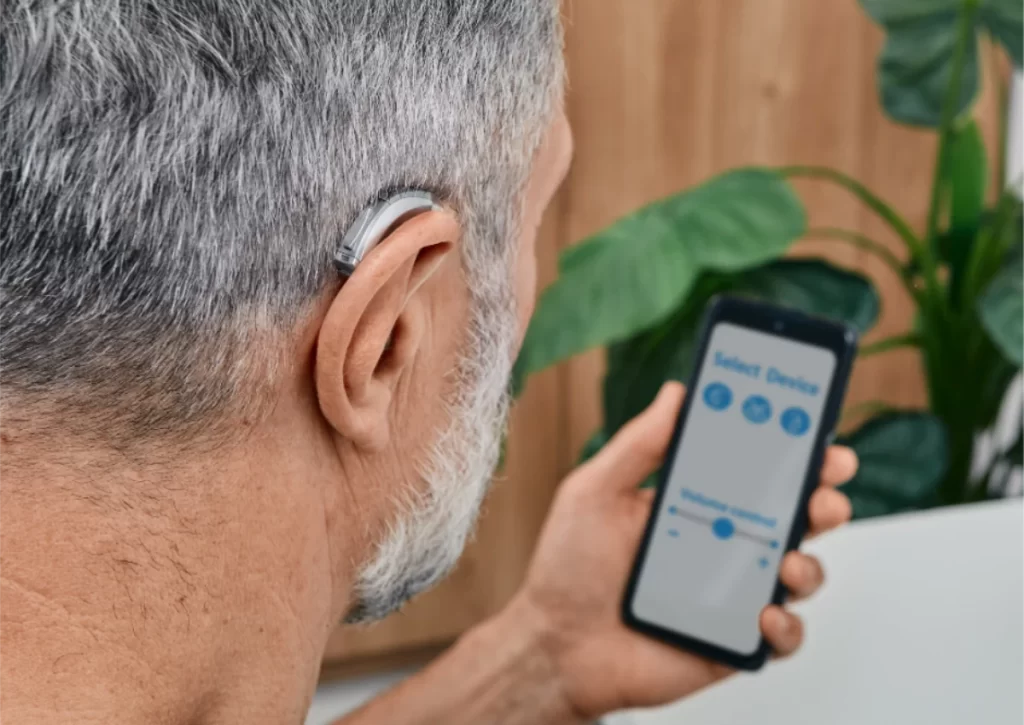10 Tips for getting used to wearing Hearing Aids

Whether you’re a seasoned user, trying a new style for the first time or looking for advice for wearing your very first device, getting used to wearing new hearing aids can be a challenging experience for anyone. Unlike eyeglasses, hearing aids do not provide an ‘immediate fix’ to hearing loss. Instead, a brief adjustment period exists, which can last for several weeks, in which the brain adjusts to being re-introduced to sounds that the ears have not heard for some time. Here at Knox Audiology, we want to make sure that you’re comfortable and satisfied with your devices, and that they enrich your wellbeing through daily use.
Take your time
The cognitive adjustment period should be pleasant but mildly challenging for most hearing-aid wearers. The aim is to slowly increase the amount of time we spend wearing the hearing aids, without becoming frustrated or overwhelmed by wearing them for too long, too quickly. Ideally, we may start by wearing them for 1-2 hours, once or twice per day at home or in a quiet, familiar environment. As we begin to become more comfortable, we may explore by wearing the aids outside the house and increase the wear time slowly until we are able to wear them all day (except for when showering, sleeping and when participating in some exercise activities). The more we can wear the new hearing aids, the quicker we will be able to get used to them.
Become comfortable with listening to everyday noise
Whilst wearing the hearing aids around the house, you may enjoy experimenting with how household noise sounds through your new devices, compared to without them. These may include the kettle boiling, the fridge humming, doors opening/closing, pets, your own voice, and different speakers in the home (or on the radio/television). This will help your brain re-learn what common, but important, noises sound like. Speech sounds will help with determining your comfortable volume level for conversations in the real world. Using closed captioning on the tv and lip-reading with a familiar speaker may be helpful in the beginning.
Always remember to follow the advice of your audiologist and go at a pace that feels challenging but comfortable for you.
Talk away, chatterbox!
You may notice that your own voice sounds different, and louder, when wearing the hearing aids. This may be because your hearing loss has caused your voice to sound gradually more muffled over time. Alternatively, wearing hearing aids (or anything that moderately blocks your ears) can cause your voice to sound louder or to echo. Partially, this effect is an element requiring acclimatization, which can be assisted by listening to your own voice, which is recommended. This can be done by speaking to family, friends, pets or reading to yourself. However, part of this effect can be adjusted by your audiologist to make wearing the devices as comfortable as possible.
Try wearing them in group conversations and in background noise
Once you are comfortable with listening to different speakers in one-on-one conversations and the sound of your own voice, try wearing your hearing aids in group conversational settings to learn how the technology functions in these environments. You may find that following what is being said is much easier with your hearing aids and enjoy these situations more. You may also notice that background noise can affect your ability to understand speech at times and develop strategies to cope with this. The more we wear our devices and become accustomed to how they work, the better we will be able to manage in these situations.
Anticipate frustration
The process of experiencing different sounds again and re-learning how to ignore background noise can be frustrating for anyone. Try to be patient and take things at a comfortable pace as your mind adjusts to the sounds that it has not heard for some time.
Practice using communication strategies with your hearing aids
Whilst hearing aids can provide a lot of benefits to our communication, they are not supposed to function as ‘bionic ears’ and will not give us ‘super hearing powers’. It is recommended that wearers become comfortable with using communication strategies in situations where hearing aids may experience difficulties. This may include situations where you are trying to understand speech in background noise, in rooms with a lot of reverberation, when speakers are softly spoken or when speech is travelling over some distance. To combat this, you may need to disclose your hearing loss to others, ask people to face you when speaking, move away from disruptive background noise or ask people to repeat themselves slowly and clearly to help you follow what has been said.
Attend follow-up visits with your audiologist
Making and attending regular appointments with your audiologist is highly recommended, especially when receiving hearing aids for the first time. Your clinician will be able to listen to and address any concerns that you may have with how the hearing aids are working and how noise is sounding. They will also assess whether your device is sitting correctly and comfortably in your ear. Whilst slight tenderness is normal initially, any pain, itchiness or swelling may need to be checked and assessed by your clinician.
Helping hands
Bringing communication partners with you to your hearing aid appointment is encouraged – whether this be a family member or friend. Those who are around us regularly may offer more information and insight into your daily communication needs and may benefit from learning more about your hearing aids and ways to help you hear speech better (communication strategies). A helping hand managing your new devices won’t hurt either!
Phone connectivity
Many modern hearing aids will offer Bluetooth and/or App connectivity. Exploring either of these options through your smartphone and learning to make use of the device’s technological capabilities can also assist in building confidence and independence for everyday use.
Auditory Training
For some people they find that although hearing aids are making everything louder, speech isn’t any clearer. This issue can be adjusted by booking an appointment with your audiologist. However, it may also be the case that some auditory training is required to strengthen your skill of listening to speech in background noise. This phenomenon can occur when our minds have not been exposed to sounds for some time, whether this be due to untreated hearing loss or another illness. Auditory training and rehabilitation are used to ‘exercise’ this muscle in our minds to regain the skill that has been weakened.
At Knox Audiology, we take pride in our team of university qualified and experienced audiologists, who are committed to providing trusted, friendly, and professional hearing services, catering to all your unique hearing needs. We are here to help you with your hearing needs and adjusting to new hearing aids. For any support, please reach out to us – call 03 9800 5697 or contact us online.
